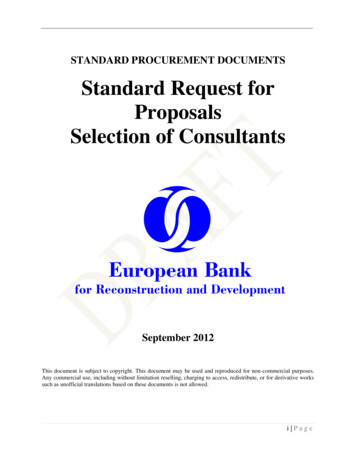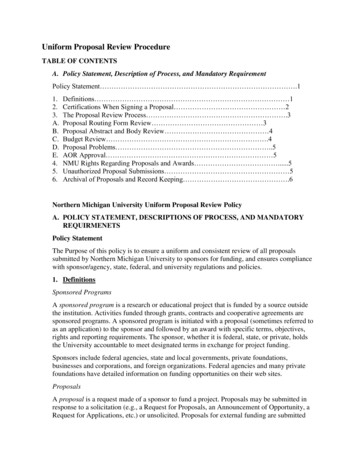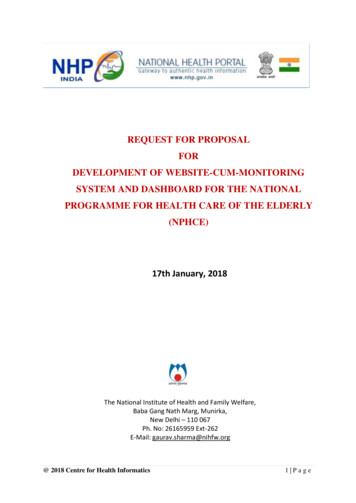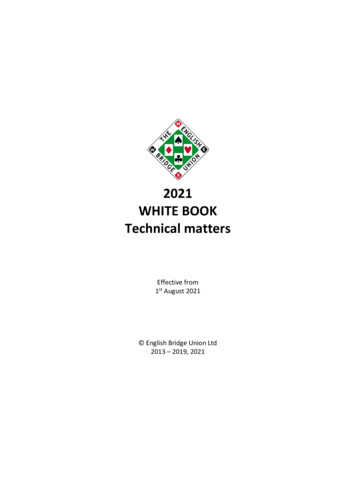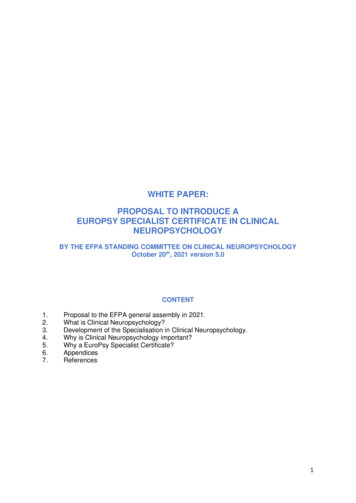
Transcription
WHITE PAPER:PROPOSAL TO INTRODUCE AEUROPSY SPECIALIST CERTIFICATE IN CLINICALNEUROPSYCHOLOGYBY THE EFPA STANDING COMMITTEE ON CLINICAL NEUROPSYCHOLOGYOctober 20th, 2021 version 5.0CONTENT1.2.3.4.5.6.7.Proposal to the EFPA general assembly in 2021.What is Clinical Neuropsychology?Development of the Specialisation in Clinical Neuropsychology.Why is Clinical Neuropsychology important?Why a EuroPsy Specialist Certificate?AppendicesReferences1
EFPA STANDING COMMITTEE ON CLINICAL NEUROPSYCHOLOGY 2021.White paper: Proposal to introduce a EuroPsy specialist certificate in Clinical Neuropsychology. 10/20/20211. Proposal to the EFPA general assembly in 2021The Standing Committee on Clinical Neuropsychology proposes to establish a project,“Establishment of a 2 year pilot phase: Specialist Certificate in Clinical Neuropsychologystarting March 2022“, in collaboration with EFPA Member Associations.The Specialist Certificate would build upon the EuroPsy Basic Certificate and haverequirements similar to the Specialist Certificates already available (see Appendix A).2. What is Clinical Neuropsychology?Neuropsychology and Clinical Neuropsychology are briefly defined by the EFPAStanding Committee on Clinical Neuropsychology: Neuropsychology is a specialised domainof psychology that is focused on the relationships between cognitive and affective functioning,the personality and behaviour of the individual, and brain functioning. Cognitive functionsinclude e.g. attention, learning, memory, language, and reasoning. Affective functions includeemotions and mood. Clinical Neuropsychology is the application of Neuropsychology inclinical situations across the life span to understand how these functions relate to either normalbrain functioning or acquired or developmental brain injury. The practice of ClinicalNeuropsychology involves a clinical interview and the use of neuropsychological assessmentmethods for diagnostic and prognostic purposes. This information can also be used forplanning, implementation and evaluation of interventions.13. Development of the Specialisation in Clinical NeuropsychologyDuring the last few decades, Clinical Neuropsychology has developed from a smallclinical discipline to an advanced and well-respected specialty internationally and in Europe2.In most countries, comprehensive academic and practical training in the field is required topractice as a specialist in Clinical Neuropsychology3.There are regional and national neuropsychological associations worldwide, providingevidence that neuropsychology and its clinical application is a specialised domain withinpsychology. In Europe, 23 neuropsychological associations with a total membership of morethan 8200 are represented in the Federation of European Societies of Neuropsychology(FESN) as of 2020. The FESN was founded in 2008 by fifteen European nationalneuropsychological societies4 and is an associate member of EFPA. Other such associationsinclude the International Neuropsychological Society (INS), founded in 19675, the AustralianPsychological Society's College of Clinical Neuropsychologists6, and the SociedadLatinoamericana de Neuropsicología7. In the USA, the Society of Clinical Neuropsychology(Division of Clinical Neuropsychology) now is the largest and fastest growing of 55 divisions ofthe American Psychological Association8. A full list of relevant neuropsychological societies,associations or sections for neuropsychology in Europe can be found in Appendix B. Itdemonstrates the interest in the area of Clinical Neuropsychology and the demand of training.In many countries a large proportion of the membership already has an advanced levelspecialization while in others the advanced training is still being developed. Appendix Ccontains the numbers of psychologists with a potential interest in a EuroPsy Specialist1Hokkanen et al., 2020;Godin et al., 2017; Kubu et al., 2016; Roper et al., 2018;3Hokkanen et al., 2019;4Federation of the European Societies of Neuropsychology (2020, April 27). Retrieved from https://www.fesn.eu/5The International Neuropsychological Society. (2020, April 27). Retrieved from https://www.the-ins.org/about-ins/6The Australian Psychological Society's College of Clinical Neuropsychologists. (2020, April 27). Retrieved fromhttps://groups.psychology.org.au/ccn/7The Sociedad Latinoamericana de Neuropsicología. (2020, April 27). Retrieved from ision/officers/services/profiles.aspx22
EFPA STANDING COMMITTEE ON CLINICAL NEUROPSYCHOLOGY 2021.White paper: Proposal to introduce a EuroPsy specialist certificate in Clinical Neuropsychology. 10/20/2021Certificate in Neuropsychology in the countries represented in the Standing Committee onClinical Neuropsychology.The proposed Specialist Certificate builds upon the Basic Certificate and the trainingis targeted to professionals that are eligible for the basic EuroPsy. Several countries inEurope (for instance the Nordic countries, Austria, The Netherlands, UK, Italy) alreadyrecognize neuropsychology as a pathway for specialism and have programmes that providetraining on the specialist level. The entry requirements include the license to practice withinclinical health care settings. Appendix D presents information on advanced level programs inClinical Neuropsychology available for candidates who already are licenced psychologists. Inthe 32 listed programmes by national providers and universities, approximately 750 personsgraduate per year. The list is based on the information the Standing Committee has been ableto collect and is not exhaustive. In many countries, completion of the specified training programensures certification as a specialist. In others, candidates provide proof of the competenciesthey have acquired when applying for membership in a specialist registry or society. Out of the24 European countries currently offering the basic EuroPsy, at least 17 have been developingtheir own models for specialist training in Clinical Neuropsychology. Most of the programmeslisted in Appendix D would likely fulfil the criteria for the proposed Specialist Certificate(Appendix A), in addition to being eligible for the basic EuroPsy. National registries for qualifiedclinical neuropsychologists with extensive training already exist for instance in the UK, Ireland,Austria, the Netherlands, and in the majority of the Nordic countries.4. Why is Clinical Neuropsychology important?The prevalence, and health impact, of brain disorders are substantial. The European BrainCouncil has monitored the situation since 2003 when they reported that disorders of the brainare the largest contributor to the total morbidity burden in Europe, accounting for 35% of alldisease burdens8. More recently, the economic costs of brain disorders were found to becorrespondingly large, constituting 24% of the total direct healthcare expenditure in Europe in20109. Since 2010 the burden in absolute terms has still increased10.It is well recognised that Clinical Neuropsychology makes a significant contribution to themanagement of a host of neurological, neurodevelopmental, neurodegenerative,psychopathological, and neuroendocrine disorders from assessment to treatment. In manycountries, a comprehensive neuropsychological assessment is considered standard for themanagement of a range of diseases and disorders affecting the nervous system and the brain.Clinical neuropsychologists are typically involved in integrated healthcare settings,participating in multidisciplinary collaborations, and contribute to the treatment andrehabilitation of patients11.Based on comprehensive clinical assessments of cognitive, affective and behaviouralfunctioning, neuropsychological assessments provide information about the daily lifefunctioning of children and adults. Schools and universities increasingly use this informationfor children and students with special needs, and other institutions use it for adults in planningvocational and neuropsychological rehabilitation. The objective data provided byneuropsychological assessment has shown high utility in follow up of patients, either tomeasure the efficacy of treatment or rehabilitation or by measuring decline inneurodegenerative disorders12.8Olesen & Leonardi, 2003;Gustavsson et al., 2011; Olesen et al., 2012;Raggi & Leonardi, 2020;11Albert et al., 2011; American Psychiatric Association, 2013; Hokkanen et al., 2019; Litvan et al., 2011; Yeates, Levin, &Ponsford, 2017; Zink, 2001;12Lezak et al., 2012;9103
EFPA STANDING COMMITTEE ON CLINICAL NEUROPSYCHOLOGY 2021.White paper: Proposal to introduce a EuroPsy specialist certificate in Clinical Neuropsychology. 10/20/2021The demands for clinical neuropsychological services are both increasing and diversifying.Within health care and community settings, Clinical Neuropsychology is the specialty with themost advanced scientifically based competencies in the analysis of cognitive, affective andbehavioural consequences of the aforementioned disorders, as well as other neurobiologicalbased diseases and disorders interfering with mental functioning. Clinical neuropsychologistsnot only assess and diagnose deficits, but also have a key role in the differential diagnosis ofpsychological, psychiatric, neurological, and neurodevelopmental disorders.5. Why a EuroPsy Specialist Certificate?Clinical Neuropsychology: (1) is a field with its own scientific knowledge base and tradition;(2) is a fast growing field in Europe and world-wide; (3) requires a standardization in trainingand practice, given the huge diversity in training and level/quality of services across Europe;(4) requires a high level of specific knowledge and competent skills from clinicalneuropsychologists to meet the expectations of society and health care systems; and (5) fitsnaturally into the EuroPsy specialisation model.Findings from surveys conducted by the EFPA SC on Clinical Neuropsychology haverevealed that the level of training and the quality of service provided by ClinicalNeuropsychologists throughout Europe varies considerably. In the European countries thatalready offer advanced training and a specialisation track, the profession of ClinicalNeuropsychology has been developed into an important discipline for the neurocognitive andaffective health care of children and adults. In some other countries in Europe this training andprofessional development hardly exists. The Specialist Certificate, the proposed trainingmodel leading to it, and the advanced competencies to be delineated, will provide anaspirational goal for countries that are still developing the training.The profession of Clinical Neuropsychology is built on a unique scientific knowledge base,well-established training, unique methodology and clinical practice. A range of competencieshas been identified that are specific to its practice, in line with the EuroPsy. An earlier Europeansurvey conducted by the Standing Committee on Clinical Neuropsychology demonstrated ahigh level of agreement among experienced senior professionals on the core competenciesneeded for the practice of Clinical Neuropsychology in the advanced level.A universal minimum standard of training and practice is necessary to ensure anacceptable level of quality across Europe and to protect from malpractice. Common high-levelstandards for education, practical training and clinical practice in Clinical Neuropsychologywithin Europe would aid in the strengthening of clinical neuropsychological services. This hasalready been achieved in the countries with high standards in Clinical Neuropsychology. Theproposed certificate will complement but not override national regulations and will notjeopardize the existing high standards.Establishing a specialisation will protect the field from self-defined “specialists” and will helpbuild a common ground for quality clinical neuropsychological services across Europe.Providing a specialist register of qualified neuropsychologists who have met the agreedminimum standards will contribute to ensuring such standards and competencies. Having aspecialisation as an addition to the basic EuroPsy will protect the public by helping societyidentify who is trained to a particular standard endorsed by EFPA. To have a common definitionof specialisation in Clinical Neuropsychology will also facilitate the free movement ofneuropsychologists across Europe. This is important, as free movement of labour is animportant EU foundation.The Standing Committee on Clinical Neuropsychology therefore recommendsestablishing a EuroPsy Specialist Certificate in Clinical Neuropsychology.4
EFPA STANDING COMMITTEE ON CLINICAL NEUROPSYCHOLOGY 2021.White paper: Proposal to introduce a EuroPsy specialist certificate in Clinical Neuropsychology. 10/20/20216. AppendicesAppendix A.Description of the requirements in the currently available Specialist Certificates within theEuroPsy framework, Psychotherapy and Work and Organizational Psychology along withthe tentative proposed requirements for Clinical Neuropsychology.RequirementPsychotherapyWork- Basic EuroPsyEducation after basicEuroPsyYes90 ECTS, of which 400 htheoryYes90 ECTS (2400h)*, ofwhich 60 courses and 30applied research/assessment/ interventionYes90 ECTS, of which 60courses and 30 appliedresearch/ assessment/intervention1ContentVary with curriculumand/or learning trajectorySpecialist curriculumframeworkSpecialist curriculumframeworkSupervised practice3 years, 500 h of worksupervised3 years, 400 h/ysupervised, “coachedprofessional practice”3 years of supervisedprofessional practiceSupervision150 h (50h/y)150 h (50h/y)150 h (50h/y)Competencies to bedemonstratedA list is being developedThose defined inEuroPsy regulations,applied to Work- andOrganizationalPsychology specializedlevelA list is being developed,based e.g., on the US2and UK3 models and thework of The StandingCommittee on d in Psychotherapytraining in one or morePsychotherapy methodsBased on an explicitsystem of CompetenceDevelopmentBased on an explicitsystem (program orflexible model)Continued ProfessionalDevelopmentBeing developed4 ECTS (100h) at themoment of application,included in the 90 ECTSTo be developedAdditional requirement100 h personal therapyNotes: * Early specialisation countries: 60 ECTS after Basic EuroPsy ECTS European Credit Transfer and AccumulationSystem and h hours1) to be later translated into hours for non-university context2) Entry-level Competencies in Clinical Neuropsychology. Retrieved from https://www.cospp.org/clinical-neuropsychology3) Competency framework for the UK Clinical Neuropsychology profession. Retrieved from http://www.bps.org.uk5
EFPA STANDING COMMITTEE ON CLINICAL NEUROPSYCHOLOGY 2021.White paper: Proposal to introduce a EuroPsy specialist certificate in Clinical Neuropsychology. 10/20/2021Appendix BSocieties/associations or specific sections of Clinical Neuropsychologyfor psychologists in Europe (at the time of the survey)Name of the society/association/section:Number of membersSuomen Neuropsykologinen Yhdistys, FinnishNeuropsychological SocietyThe Norwegian NeuropsychologicalAssociationSveriges Neuropsykologers förening (SwedishNeuropsychological età Italiana di neuropsicologica (SINP)300https://sinp-web.orgSociety of Specialists in Clinicalneuropsychology (AISN)Società degli Psicologi di areaneuropsicologica iaspan.itIcelandic Neuropsychological Association(TSÍ). This is now (since October 2020) a veryinformal association, with no board ofgovernors or other formalitiesGesellschaft für Neuropsychologie Österreich4008Ordem dos Psicólogos 37380www.gnpoe.at30http://spnpsy.rf.gdPortuguese Society of Neuropsychology(Sociedade Portuguesa de .pt/enCzech Association for Neuropsychology(CANP)Section for Clinical Neuropsychology, Czechand Moravian Psychological Society (CMPS)44www.canp.cz47https://cmpsy.cz/?page neuropsyCzech Neuropsychological Society10www.cenes.czHellenic Neuropsychological hological-society/Hellenic Psychological Society, Division ofNeuropsychology11www.elpse.com/enBritish Psychological Society [Division ofNeuropsychology]600www.bps.org.ukOrganisation Française des Psychologuesspécialisés en Neuropsychologie (OFPN) /French association of neuropsychologists517www.ofpn.frSociété de Neuropsychologie de LangueFrançaise (OFPN) / French society ofneuropsychologyThe Dutch Neuropsychological ers with advanced specialization in neuropsychology6
EFPA STANDING COMMITTEE ON CLINICAL NEUROPSYCHOLOGY 2021.White paper: Proposal to introduce a EuroPsy specialist certificate in Clinical Neuropsychology. 10/20/2021Appendix C.EuroPsy Holders, EuroPsy holders fulfilling specialist criteria in (ClinicalNeuropsychology, certified (Clinical) Neuropsychologists, and registeredpsychologists in the European countries represented in the Standing Committee.Numbers of EuroPsy holders were taken from https://www.europsy.eu/ by Sept. 30th, 2021.The numbers of EuroPsy holders fulfilling specialist criteria in (Clinical) Neuropsychology(CNP) have been estimated by national specialists. The numbers of national specialists inCNP, and registered psychologists have been given from the national members by Oct., 2021.EuroPsyholders,efpa.eu registerEuroPsy holders,fulfilling specialistcriteria in CNPCertified (Clinical)Neuropsychologists,national sourcesRegisteredPsychologists,national sourcesAustria95ND*20511.078Cyprus1540745Czech 4378 n47428611.500UK295NDNDND7.5021393.016151.633****13 active and2 correspondingmembers of theSC (of 38 EFPAmembers)* Not determined.** Those are psychologists that are acknowledged as having special expertise (registered as experts in ClinicalNeuropsychologists or Clinical Psychology by the Directorate of Health) above the minimum requirements (6 are PhDs, 3 MSc).There is a total of 920 licensed psychologists in Iceland (i. e. they are licensed by the Directorate of Health to practice and fulfilat least the minimum requirements (M.Sc.) to practice psychology).*** Data collected in 2020, representing numbers of certified Psychologists with advanced specialization in Neuropsychology; ina rough estimate, at least 30% of these should fulfil the criteria for a specialist certificate in CNP.**** This figure is too low, as it was not possible to obtain the numbers from many states, including the big countries Russia, theUK and Italy.7
EFPA STANDING COMMITTEE ON CLINICAL NEUROPSYCHOLOGY 2021.White paper: Proposal to introduce a EuroPsy specialist certificate in Clinical Neuropsychology. 10/20/2021Appendix D.Specialist programmes / courses in Clinical Neuropsychology in Europe. Table 1 refers to programmesor courses by national providers that are available ONLY for qualified psychologists with basicEuroPsy or equivalent. Table 2. lists similar programmes provided by universities. Table 3 lists otherspecialist programmes that are available in Europe.Table 1. Specialist programmes / courses in Clinical Neuropsychology by national providersavailable ONLY for qualified psychologists with basic EuroPsy or equivalentAustriaGesellschaft fürNeuropsychologie ÖsterreichCurriculum Clinical Neuropsychologywww.gnpoe.atCzech RepublicInstitute of Clinical Psychologyand Czech NeuropsychologicalSocietyCertificate course ClinicalNeuropsychology of tute of PostgraduateEducation, Ministry of HealthCertificate course Practical kovany-kurz/Institute of PostgraduateEducation, Ministry of Health(collaboration 1.st Faculty ofMedicine, Charles University)Certificate course ClinicalNeuropsychology of sychologiedospelych-2021-2022/Motol University HospitalCertificate course ClinicalNeuropsychology - detskaklinicka-neuropsychologie/Curriculum klinische Neuropsychologie derGesellschaft für Neuropsychologiewww.gnp.deSpecialist education in clinicalneuropsychology for ecialist in Neuropsychologyhttps://www.psykologforbundet.se utbildningar ochcertifikat SpecialistutbildningCurriculum Clinical europsycholoogGermanyGesellschaft fürNeuropsychologie (GNP)NorwayThe Norwegian PsychologicalAssociation (NPF)SwedenSveriges Psykologförbund, SPF(Swedish PsychologicalAssociation)The NetherlandsFederation for health psychologyand psychotherapy (FGzPt)under governance of the Dutchministry of Health (VWS)8
EFPA STANDING COMMITTEE ON CLINICAL NEUROPSYCHOLOGY 2021.White paper: Proposal to introduce a EuroPsy specialist certificate in Clinical Neuropsychology. 10/20/2021Table 2. Specialist university programmes in Clinical Neuropsychology available ONLY forqualified psychologists with basic EuroPsy or equivalentCzech RepublicCharles UniversityCertificate course ClinicalNeuropsychology of alisation Programme ieteellinen-tiedekunta/psykologia section-31161Postgraduate Master in aster/neuropsicologia-clinicaUniversità Cattolica del SacroCuorePostgraduate Master inNeuroscienze Cliniche:Valutazione, Diagnosi eReabilitazione neuropsichologica azioneneuropsicologica-e-neuromotoria1667Lumsa UniversitàPostgraduate Master inNeuropsicologia Clinicahttps://www.lumsa.it/corsi mastersecondo livello neuropsicologia clinicaUniversità del SalentoPostgraduate Master in Esperto divaluzione e RiabilitazioneNeurocognitiva dell eta Evolutiva,dell adulto e dell -laurea/master-di-i-e-iilivelloUniversita del degli Studi diVeronaPostgraduate Master inNeuropsicologia Clinica esperimentalehttps://www.emagister.it/corso master neuropsicologia clinica e sperimentale ii livelloec2791509.htmPost- Graduate Diploma in versity of BristolMaster in ClinicalNeuropsychology, opsychology/University College LondonPost-graduate Diploma in ClinicalNeuropsychology hology-mscFinlandUniversity of Helsinki / FinnishUniversity Network of Psychology(Psykonet)ItalyUniversità degli Studi di Padovahttp://www.psykonet.fi/englishSchool of Specialisation inClinicalNeuropsychologyUKUniversity of Glasgow9
EFPA STANDING COMMITTEE ON CLINICAL NEUROPSYCHOLOGY 2021.White paper: Proposal to introduce a EuroPsy specialist certificate in Clinical Neuropsychology. 10/20/2021Table 3. Other specialist programmes in Clinical NeuropsychologyGreeceSchool of Psychology, AristotleUniversity of Thessaloniki,Thessaloniki, GreeceMaster’s program in ClinicalPsychology and Neuropsychology,Clinical Neuropsychology -and-neuropsychologyDepartment of Neurology,University of Athens, Athens,GreeceMaster’s program in ClinicalNeuropsychology and taptychiakes spoydes/programmata metaptychiakon spoydon eisachthentes apo to akad etos 2018 19/pms koina diethni/kliniki neyropsychologia noitikes neyroepistimes/City College, International Facultyof Sheffield, Thessaloniki, GreeceMaster’s program in ld.eu/frontend/articles.php?cid 346&t MAin-Clinical-NeuropsychologyDepartment of Psychology,Scientific College of Greece,Université Strasbourg, Athens,GreeceMaster’s program in ClinicalCognitive tyxiako-cogn-neuropsy/Interuniversity Master in Clinicaland de do AlgarveMaster in Cognitive Neuroscienceand niversidade de AveiroMaster in Health Psychology andNeuropsychological dade Católica & ISPAMaster in ologyInstituto Universitário de Ciênciasda SaúdeMaster in Health Psychology y/Universidade LusófonaMaster in e do Minho /Universidade de Coimbra /Universidade de LisboaRussiaMoscow State Psychological andPedagogical University, MoscowDepartment of PsychologyLomonosov Moscow StateUniversity, MoscowNeuropsychology of childhood.NeurodiagnosticsNeuropsychological approach tocorrection children developmentaldisordersPropaedeutics of theneuropsychological approachMethods of neuropsychologicaland psychophysiologicalassessmentNeuropsychological Rehabilitation10
EFPA STANDING COMMITTEE ON CLINICAL NEUROPSYCHOLOGY 2021.White paper: Proposal to introduce a EuroPsy specialist certificate in Clinical Neuropsychology. 10/20/2021Pediatric Neuropsychology:assessment and adjustmentKarvasarsky Institute ofpsychotherapy and clinicalpsychology, S-PetersburgFundamentals ofneuropsychological diagnostics,correction and rehabilitation11
EFPA STANDING COMMITTEE ON CLINICAL NEUROPSYCHOLOGY 2021.White paper: Proposal to introduce a EuroPsy specialist certificate in Clinical Neuropsychology. 10/20/2021ReferencesAmerican Psychiatric Association (2013). Diagnostic and Statistical Manual of Mental Disorders, DSM-5. Washington, DC &London, UK.Australian Psychological Society's College of Clinical Neuropsychologists. (2020, April 27). Retrieved fromhttps://groups.psychology.org.au/ccn/Albert, M.S, DeKosky, S.T., Dickson, D., Dubois, B., Feldman, H.H., Fox, N.C., Gamst. A., Holtzman, D.M., Jagust, W.J.,Petersen, R.C., Snyder, P.J., Carrillo, M.C., Thies, B., Phelps, C.H. (2011). The diagnosis of mild cognitive impairment due toAlzheimer's disease: recommendations from the National Institute on Aging-Alzheimer's Association workgroups on diagnosticguidelines for Alzheimer's disease. Alzheimers Dement 7, 270-279.European Federation of Psychologist’s Association, EFPA. EuroPsy and EuroPsy Regulation. Retrieved from https://wwwefpa.eu/europsy/Federation of the European Societies of Neuropsychology (2020, April 27). Retrieved from https://www.fesn.eu/Godin, J., Armstrong, J.J., Rockwood, K., Andrew, M.K. (2017). Dynamics of Frailty and Cognition after Age 50: Why It Mattersthat Cognitive Decline is Mostly Seen in Old Age. J Alzheimers Dis.; 58(1):231-242. doi: 10.3233/JAD-161280.Gustavsson, A., Svensson, M., Jacobi, F., Allgulander, C., Alonso, J., Beghi, E., Olesen, J., & CDBE2010 Study Group. (2011).Cost of disorders of the brain in Europe 2010. European Journal of Neuropsychopharmacology, 21, 718–779.Hessen, E., Hokkanen, L., Ponsford, J., van Zandvoort, M., Watts, A., Evans, J., & Haaland, K. (2018). Core competencies inClinical Neuropsychology training across the world. The Clinical Neuropsychologist, 32, 642–656.Hokkanen, L., Lettner, S.M., Barbosa, F., Constantinou, M., Harper, L., Kasten, E., Mondini, S., Persson, B., Varako, N. &Hessen, E. (2019). Training models and status of clinical neuropsychologists in Europe: results of a survey on 30 countries. TheClinical Neuropsychologist, 33, 32-56. doi: 10.1080/13854046.2018.1484169Hokkanen, L., Barbosa, F., Ponchel, A., Constantinou, M., Kosmidis, M., Varako, N., Kasten, E., Mondini, S., Lettner, S.M.,Baker, G., Persson, B. & Hessen, E. (2020). Clinical Neuropsychology as a specialist profession in the European health care –Developing a benchmark for training standards and competencies using the EuroPsy model? Frontiers in Psychology, 06October 2020. onal Neuropsychological Society. (2020, April 27). Retrieved from https://www.the-ins.org/about-ins/Kasten, E., Barbosa, F., Constantinou, M., Kosmidis, M.H., Baker, G.A, Ponchel, A., Mondini, S., Jonsdottir, M.K., Harper, L.,Pranckeviciene, A., Varako, N., Nikolai, T., Persson, B.A., Hokkanen, L., Lettner, S. & Hessen, E. (2020). European ClinicalNeuropsychology: Role in Health Care and Access to Neuropsychological Services. Submitted manuscript.Kubu, C.S., Ready, R.E., Festa, J.R., Roper, B.L., & Pliskin, N.H. (2016). The Times They Are a Changin: Neuropsychology andIntegrated Care Teams. The Clinical Neuropsychologist, 30(1): 51-65. doi: 10.1080/13854046.2015.1134670Litvan, I., Aarsland, D., Adler, C. H., Goldman, J. G., Kulisevsky, J., Mollenhauer, B., Weintraub, D. (2011). MDS Task Force onmild cognitive impairment in Parkinson's disease: Critical review of PD-MCI. Movement Disorders, 26(10), 1814-1824. doi:10.1002/mds.23823Lezak, M.D., Howieson, D.B., Bigler, E.D., & Tranel, D. (2012). Neuropsychological Assessment. 5th Ed. Oxford UniversityPress.Olesen, J., & Leonardi, M.
Neuropsychology and Clinical Neuropsychology are briefly defined by the EFPA Standing Committee on Clinical Neuropsychology: Neuropsychology is a specialised domain of psychology that is focused on the relationships between cognitive and affective functioning, the personality and behaviour of the individual, and brain functioning.

